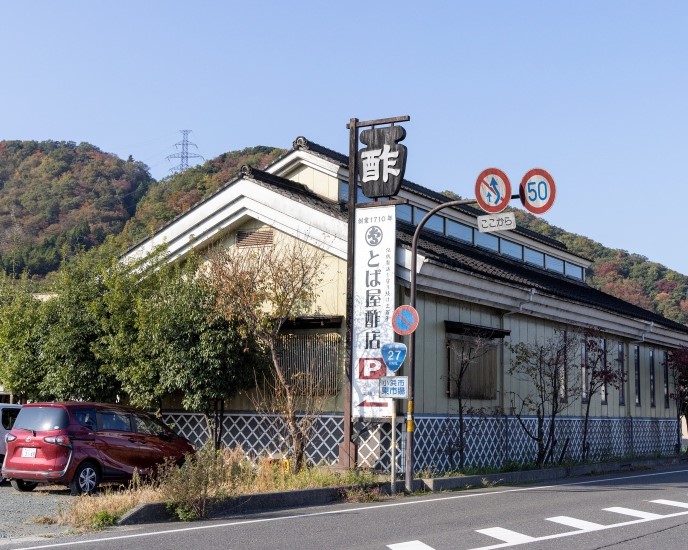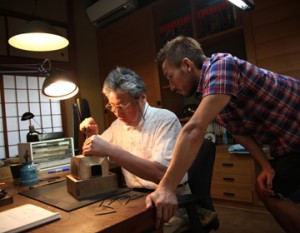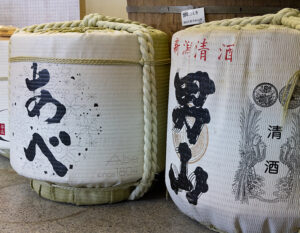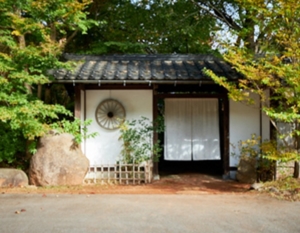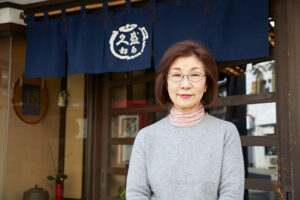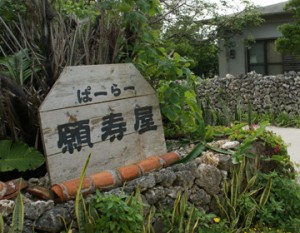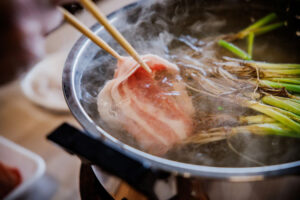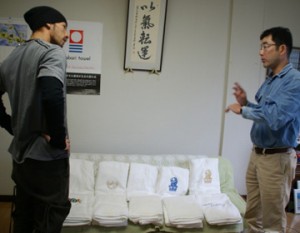Located in Obama City, Fukui Prefecture, Babaya Vinegar Store is a rice vinegar brewer that was founded in the mid-Edo period and has been in business for more than 300 years. While continuing to preserve the tradition of preparing pure rice vinegar in a jar, which is rare in Japan, the company is also actively involved in the dissemination of information and the development of new products. The tradition of Tobaya Vinegar Store is gaining in brilliance in the modern age.
Vinegar brewed in Obama, which supported Kyoto’s food culture

Tobaya Vinegar Store is located in Obama City facing Obama Bay, which is part of the Wakasa Bay National Park. Obama City, blessed with rich marine products from the Sea of Japan, was once called “Wakasa Province” and was one of the “Miketsukuni” (provinces that offered marine products to the Imperial Court). In the Edo period (1603-1867), the city became the Obama domain and prospered as a base for Kitamae-bune, or Kitamaebune. The mackerel caught in Obama was transported to Kyoto, and the road leading from Obama to Kyoto is called “Saba Kaido (mackerel road),” and is now recognized as a Japanese Heritage Site.
Rice vinegar, an essential Obama specialty
The salt and vinegar used to preserve the seafood transported from Obama to the capital of Kyoto has given rise to specialties such as “sasazuke (pickled sea bream)” and “saba-zushi (mackerel sushi),” both of which have continued to be produced to this day. The small sea bream, also known as lenkodai or hanaoredai, is cut into three pieces, lightly salted, and then vinegared, and packed tightly in small cedar barrels with bamboo leaves. Rice vinegar from Tobaya Vinegar Store is used in many of the small sea bream sasazuke and saba-zushi made in Obama.
The brewing process has been continued for more than 300 years in a “jar”.

Tsubonosu, the signature product of Tobaya Vinegar Store, is a pure rice vinegar brewed in large jars that can hold more than one pound, as the name suggests. It is a spectacular sight to see 30 jars with a capacity of approximately 300 liters buried in the rice husks that are spread deep under the floor of the vinegar cellar. The Tobaya Vinegar Store has maintained the method of making vinegar by fermenting and maturing it in these jars for more than 300 years.
Pure rice vinegar with the flavor and sweetness of rice
When acetic acid bacteria are added to alcohol, the alcohol content is converted to acetic acid during the fermentation process, producing vinegar. In the case of pure rice vinegar, acetic acid bacteria are generally added to pure rice wine, which is fermented and then aged to complete the process. The principle is the same for tsubo-no-zu, but Tobaya Vinegar Store has maintained its original method of preparing it using amazake (sweet sake) and tanezu (seed vinegar).
Amazake is made by steaming Fukui Prefecture’s “Hanaetizen” rice, adding homemade rice malt, water pumped up from underground, and pure rice wine, and keeping it at 55°C for one whole day. The “seed vinegar” is the vinegar from the previous batch, which contains a lot of active acetic acid bacteria. The mixture of amazake and seed vinegar is poured directly into the jar, and then spread around the jar to ferment for one to two months while keeping it warm. At this time, an “acetic acid bacterial film” gradually appears on the surface and decomposes the alcohol to produce vinegar. A thick, beautiful film on the surface is a sign that fermentation has been completed to a good degree. About one-third of this is left to be used as seed vinegar for the next brewing.
After fermentation is complete, the vinegar is transferred to wooden barrels and aged for at least two months. After maturing, a large amount of steamed rice from the ingredient amazake remains, so the process of straining is necessary. The process of preparing amazake without filtering is a traditional method unique to Tobaya Vinegar Store, and is intended to add plenty of rice flavor to the vinegar. After the process of filtration and sterilization, the vinegar is made into tsubono-vinegar and shipped. The taste is full of the flavor and sweetness of rice, and the acidity is mild without being angular. It enhances the flavor of food, of course, but it is also delicious diluted and drunk on its own as it has no harshness.
Delicious Vinegar” to Enhance Dishes

The general method of making vinegar used by major manufacturers is “continuous fermentation,” in which fermentation is accelerated by forcing air into the vinegar to speed up the process, resulting in vinegar in just a few days. On the other hand, Tobaya Vinegar Store’s Tsubo-no Vinegar is made by a traditional method called “Seichi-Hakko,” in which the vinegar is left to ferment without stirring, using only the power of acetic acid bacteria, which takes more than four months. The reason why Tobaya Vinegar Store continues to spend so much time and effort to produce Tsubo-no-zu even in this day and age is nothing short of its commitment to producing “delicious vinegar that enhances food. However, the value of this commitment is only recognized when it is recognized. Takayuki Nakano, the 13th generation owner of Tobaya Vinegar Store, says, “I want to expand ‘sympathy’ for the store,” and has been making efforts to let today’s consumers know about Tobaya Vinegar Store’s commitment and history. This goes back to the time when the product name “Tsubono-zu” was created.
Visualizing” 300 years of tradition

Later, Mr. Nakano enrolled in the Department of Brewing and Fermentation at Tokyo University of Agriculture. While still a student, he established the website of Tobaya Vinegar Store with the help of his friends. After graduation, he attended graduate school at the University of Tokyo and joined a management consulting firm. After gaining experience there for three years, he returned to Obama in 2005 and began working at Tobaya Vinegar Store. Having keenly realized the importance of customer communication at the consulting firm, Mr. Nakano stepped up efforts to shorten the distance between Tobaya Vinegar Store and consumers. First, he renewed his website, which he had created as a student and neglected, and made his products available for online purchase. She also introduced in detail the history and commitment of Tobaya Vinegar Store and the process of making Tsubano-zu. Since then, the company has repeatedly renewed its website to make it easier for consumers to view and purchase its products, leading to the development of new customers.
Mr. Nakano says that it was difficult for a small, family-run brewery to tackle online shopping on its own. He attributes his success to his experience as a consultant. He has worked with large companies that have repeated cycles of business improvement, and he believes that this is important regardless of the size of the company, so he worked on it at Tobaya Vinegar Store as well. Currently, online sales are growing as a new pillar of sales.
Developing a succession of new products that capture the times

Mr. Nakano also focused on developing new products. He developed a succession of popular products that continue to this day, including “Vinegar Honey,” a drinkable vinegar blended from Tsubono-vinegar and acacia honey, “Oteremakara Vinegar,” which makes it easy to make vinegared food, and “Handmade Salted Koji Rice Malt Kit.
Among the new products, Mr. Nakano is particularly excited about the potential of vinegar honey. The market for vinegar for drinking has been expanding, sparked by black vinegar and fruit vinegar, and a nationwide survey of the market size of vinegar for household use in 2020 showed that vinegar for drinking exceeded that for cooking.
In anticipation of the growing health consciousness, Mr. Nakano is strengthening his lineup of drinking vinegar products. Recently, products containing ingredients said to boost the immune system in vinegar honey and fruit vinegar made by adding “maguey syrup” and fruit juice, which prevents blood sugar from rising, have been selling well, attracting repeat customers mainly through online sales.
Traditional pure rice vinegar from across the sea
The price of Tsubono-zu, the signature product of the Tobaya Vinegar Store, is almost double that of rice vinegar made by major manufacturers. Even so, sales of Tsubono-zu are strong. Many of our customers, such as restaurants, continue to use Tsubono-zu because they can get our taste because of it,” says Nakano.
Even today, most of the fishmongers, sushi bars, and restaurants in the local Obama area are clients of Tobaya Vinegar Store. The traditional vinegar making process, which has been preserved for more than 300 years through mutual support with the local community, is very time-consuming and labor intensive, and is no longer seen at other breweries. In 2010, he developed a new product called “Sakura Vinegar” at the request of a buyer with connections to a French restaurant in Paris. Sakura Vinegar” is made by marinating cherry blossom petals in Tsubono-vinegar-based sweet vinegar for one year, and was used by Michelin-starred restaurants. It is still shipped in limited quantities in the spring. Tsubono-zu and drinking vinegar are now also shipped to Europe, Australia, and Taiwan through buyers.
Making vinegar is a “divine work” of fermentation.
Mr. Nakano has pioneered the need for vinegar by developing numerous products that meet the changing times. While he will continue to take on new challenges, he is determined never to forget the “gratitude and appreciation for the power of nature” that he inherited from his predecessors.
Nakano says that the fermentation of Tsubono-vinegar is a “work of God” that transcends human technology, and that “fermentation is a force of nature. All humans can do is to wait for the right conditions to be created.



